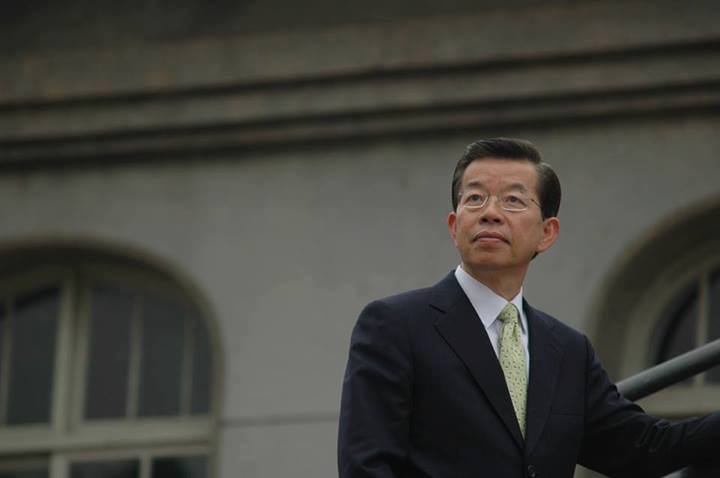by Brian Hioe
語言:
English
Photo Credit: Presidential Office
WOULD THE DPP ever seek rapprochement with China? Indeed, as absurd as this question may seem to many international observers of Taiwanese politics who look at Taiwan from afar and remain convinced that the DPP is a diehard pro-independence political party, this is not impossible as a political possibility.
Namely, in past periods in which the DPP was left in the political wilderness, such as during the Ma administration, the DPP actually seemed to be considering whether to seek rapprochement with China. DPP heavyweight Frank Hsieh’s 2012 trip to China, for example, seemed to aimed at pondering this possibility, with Hsieh proposing that the DPP attempt to conduct relations with China on the basis of his political stances of “one Constitution, two interpretations” and “constitutional consensus”. During his trip, Frank Hsieh, the DPP’s presidential candidate in 2008, and a former party chair and one of the party’s founders, claimed that he planned to travel to China 12 years ago, when he was mayor of Kaohsiung, but that this was blocked by then-president Chen Shui-Bian.
 Photo credit: Frank Hsieh/Facebook
Photo credit: Frank Hsieh/Facebook
This event took place because of soul-searching by the DPP following the KMT retaking power under the Ma Ying-Jeou presidency and what appeared to be the success of Ma’s cross-strait policies which brought Taiwan closer to China. However, the outbreak of the Sunflower Movement in 2014 seemed to illustrate to the DPP that it was likely misreading trends in Taiwanese politics, leading to what appeared to be an end to the DPP reevaluating its China policy.
Accordingly, this is why debates within the DPP about revising the party charter to remove its Taiwanese independence clause have been highly politically charged within the party. Namely, backlash against this idea is not merely for the ideological view that the party will lose its historic identity from backing away from Taiwanese independence, even if the party has long since ceased to overtly advocate Taiwanese independence, or ideological contention about the political stances of ROC independence versus Taiwanese independence.
Rather, it is feared that this represents the growing strength within the party of elements not opposed to some form of rapprochement with China. This probably would not take the form of advocacy of unification per se, but probably attempts to rebuild ties with China. It may be that the DPP may pursue such a line absent of any hardening of China’s political line against Taiwan following the 19th National Congress of the Chinese Communist Party, for example, hoping that this means there is room to reestablish good relations with China and becoming too enthusiastic about the idea. This could be dangerous if this leads the DPP to be taken unaware by Chinese “United Front” stratagems, as seems to have occurred with Taipei mayor Ko Wen-Je.
 The Presidential Office lit up for Double Ten celebrations. Photo credit: Presidential Office
The Presidential Office lit up for Double Ten celebrations. Photo credit: Presidential Office
It will not do, then, to assume that DPP will always adhere to preserving Taiwan’s independence or de facto independence and to justify the DPP hewing to cross-strait stances which on paper do not look so different from the KMT’s, with the blind faith that the DPP has Taiwan’s best interests in mind. The possibility of a change in course by the DPP is far from groundless suspicion, although this would occur less because of a political betrayal, but because of political naivete in dealing with China, or misreading of current trends in Taiwanese identity, something the DPP may not actually have its finger on the pulse on as closely as it sometimes appears to outsiders.
Indeed, it seems unlikely that the Tsai administration would ever acknowledge the 1992 Consensus at this point, having staked too much political capital on refusing to acknowledge the 1992 Consensus to reverse course without significant loss of face. But for Tsai, far from an ideologue with outspoken views of her own but more of a negotiator with public opinion, one can very well imagine a scenario in which the Tsai administration decides to change political policy because of what it perceives to be the political trends within Taiwanese society which would not be opposed to reopening relations with China.
Calls by Tsai during National Day celebrations for a new leaf in cross-strait relations, hailing the thirtieth anniversary of direct exchanges between Taiwan and China, may not have only been a message to China, but a trial balloon aimed at seeing what reactions from the Taiwanese public would be during this idea. In the meantime, one can see how quickly DPP politicians formerly known for outspoken pro-independence views can switch course in the case of William Lai, who continues to claim that he advocates Taiwanese independence while having shifted positions to ROC independence.
 Photo credit: Presidential Office
Photo credit: Presidential Office
Blind faith that the DPP will always safeguard Taiwan’s best interests is unwarranted. The DPP is a political party and like any other political party, its views may shift depending on what it perceives is necessary to win public opinion. The DPP also suffers from that, as with any other political party, it can come to be unduly influenced by big business, and it is often in the interests of big business to conduct economic exchanges with China.
Oversight over the DPP is needed, too, on its China policy then. But with the DPP firmly in political ascendancy and the lack of any other powerful political party able to push the DPP on issues regarding Taiwanese sovereignty, the DPP has no oversight over it. It remains to be seen if this will change in the future, but this also is why it is important to continue pushing the DPP to pursue some means of permanently securing Taiwan’s de facto independence, rather than urging that these demands be dropped in favor of maintaining the status quo in perpetuum and hoping that this is enough for Taiwan.

